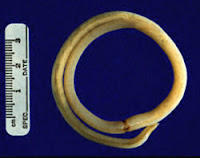Anyway.
Recently I admitted a patient with vague abdominal pain, and since the surgeons decided not to cut him open and the ER attending wouldn't let me send him home, the guy was admitted. (That's another whole story) We gave him a laxative and some Motrin, but figured we'd also try to figure out if anything else was going on, so among other things I wrote for an anti-S. cerevisiae level, as this antibody is elevated in Crohn's. The nurse taking off the orders was new, and unfamiliar with the computer, which will auto-complete the orders as they are written, and instead she sent an Ascaris lumbricoides battery. I've had similar problems with the computer before, and as both of the computer abbreviations for these labs begin "ASC..." it was an easy mistake to make.
 Ascaris, for the one or two non-medical readers out there, is a roundworm which is very common in third world countries, but not so much in the yuppie demographic my patient belonged to. I saw the order in the computer later on the night of admission, and went to change it, but the original had already been sent. So we sent the Crohn's lab and thought no more about it.
Ascaris, for the one or two non-medical readers out there, is a roundworm which is very common in third world countries, but not so much in the yuppie demographic my patient belonged to. I saw the order in the computer later on the night of admission, and went to change it, but the original had already been sent. So we sent the Crohn's lab and thought no more about it.Flash forward a week. The patient is discharged, and as far as I know still having the vague abdominal pain when his labs start to come back. And though he doesn't have Crohn's, he does have roundworms. It's an easy disease to treat here in America, but we never would have caught it if the nurse had had more training.
